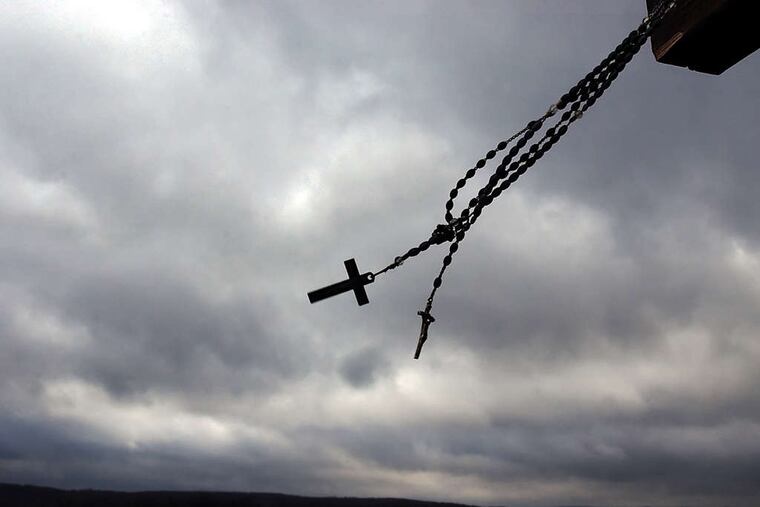Civic virtues of Sept. 11, then and now
By Silvio Laccetti Whether it relates to foreign policy, national government, or civic and cultural life, we Americans are used to hearing a growing crescendo of voices tell us we have lost our "moral compass." Just what is it that has been lost?

By Silvio Laccetti
Whether it relates to foreign policy, national government, or civic and cultural life, we Americans are used to hearing a growing crescendo of voices tell us we have lost our "moral compass." Just what is it that has been lost?
I came to grips with this question as I considered the legacy of two September 11ths in American history. My deliberation began when a family friend, Frances Anderson of Leonia, rediscovered a 200-year-old family Bible as she prepared to leave her residence of four decades.
This Bible was dedicated to the Rev. Benjamin Wooster of Fairfield, Vt. - a distant relative of Frances' - by Daniel Tompkins, then governor of New York and later vice president in the administration of President James Monroe.
Inscribing the Bible, Tompkins commended the reverend for organizing and leading Fairfield's militia to the critical battle of Plattsburgh, N.Y., on Sept. 11, 1814, during the War of 1812. The engagement took place not long before the signing of the Treaty of Ghent, which ended the war.
As I researched the history of this battle and this Bible, I soon established a reference point regarding a moral compass in George Washington's Farewell Address. One of his most important exhortations to Americans concerned the role of religion (no special faith, no particular denomination) in fortifying our nation. "Reason and experience both forbid us to expect that national morality can prevail in exclusion of religious principles," he said. There must be some recognition of a higher spiritual power that guides human political and social interaction.
Washington's affirmations embody a classical Roman form of civic virtue, in which piety and political freedom go together - certainly an odd conception in today's world. But the coupling comes alive in the letters accompanying the 19th-century Bible.
Gov. Tompkins commends the Rev. Wooster for his distinguished part in repelling a mighty British invasion of New York state. Wooster organized his parishioners and with them, "repaired with alacrity to the tented field," spurning any special treatment once encamped. The governor characterized Wooster's actions as a striking example of devotedness to the cause of a beloved country, an example to the virtuous and pious in times of trial and war.
Wooster's reply reveals his own larger-than-life character. In 1776, at age 14, he had served four months in the army during the American Revolution. By age 16, he had begun serving a three-year hitch with Washington's army in New Jersey.
In 1814, the reverend answered his country's call again, leaving his flock in mid-service, even as they implored him: "Will you not preach with us this once? We fear we will see you no more." Not dissuaded, Wooster bade them a tender adieu and with his "family in tears, kissed his clinging babes and set out immediately."
His reply concludes with a pointed reference to the gifted Bible:
"This Holy Book taught me to march for Plattsburgh, and taught me how to behave while I was there."
The good citizen learns his station from religious values. Washington would have been beaming.
This civic virtue evidenced in that long-ago Sept. 11, and under challenge even then, disappeared somewhere in the haze of America's 1960s and '70s. Today, we have many forces clamoring to create, in effect, a totally omnipotent secular state. Examples range from the actions to eliminate the words under God from our mottos and pledges to the court battles over government policies and what some believe are infringements on religious liberty.
Despite our many differences, in the aftermath of the dreadful terrorist attacks of Sept. 11, 2001, the nation saw a temporary resurrection of that classical civic virtue. Once again, Americans rallied for their beloved country. Religious faith (of all denominations and persuasions) was much in evidence in this national mood and leaders regularly invoked divine power in their speeches.
From tweens and teens to golden-agers, everyone wanted to help, to do something to help America. Many did, each in his or her own fashion. In the immediate aftermath of the tragedy, we were America Unanimous. We stood as one, hoped as one. Religious spirit played a big part, as a collective will fortified the land and a common spirit soared above.
That was then, Sept. 11 past. Yes, this year we will observe the date and honor those who served and fought in 1814 and those who suffered and died in 2001. But America Unanimous is now a quaint memory.
That special unity is gone. We are riven internally by intense political, economic, and cultural wars. Government does not work. Civic virtue hides in fear. The moral imperative seems to be: "Don't do anything stupid."
The road ahead is dark. Can America move forward without a moral compass?